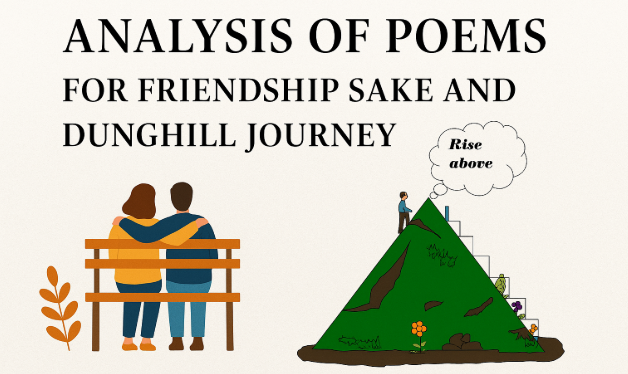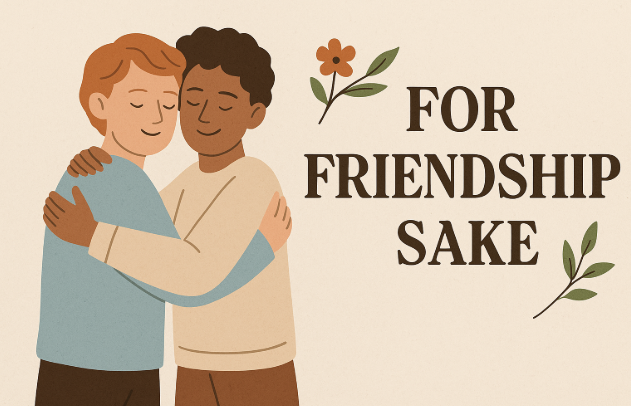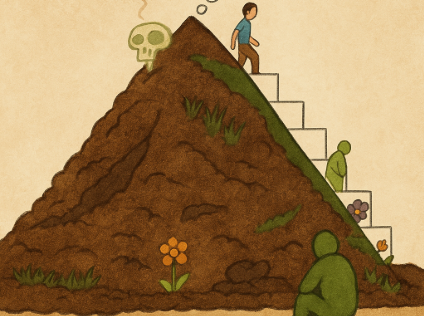This “Analysis of Poems | For Friendship Sake and Dunghill Journey” follows the release of my “Poetry Anthology, Veron Lee Campbell | Nothing Wasted Journey.”

I felt compelled to revisit two of the most personally transformative poems in the collection: For Friendship Sake and Dunghill: Going Uphill.
These works were born out of deeply human experiences—disappointment and resilience—and reflect not only the weight of what was endured, but the strength of what emerged.
In this follow-up piece, I take you behind the verses to explore the layers of meaning woven into each poem. More than literary reflection, this is a continuation of the journey. It’s an unveiling of the spiritual and emotional truths that informed the writing.
Additionally, it’s an invitation to examine your own life through the lens of restoration, growth, and grace.
Whether you’ve walked through broken friendships or pressed upward through life’s messiness, I pray that these insights meet you where you are—and remind you that nothing is wasted, not even the ache.
Thematic Analysis | For Friendship Sake
Fragility and Strength of Friendship
At the core of the poem is a dual awareness: friendship is fragile and should be preserved (“unmarred, unbroken, uncorrupt”). Furthermore, it holds an enduring strength when rooted in love and shared experience (“like a covenant with blood”). The poem elegantly navigates this tension.
Time, Change, and Memory
There is a clear recognition that time alters relationships (“The years swirled by and memories fade”), but not their original worth or impact.
The line “Forgotten treasures lost in trade” suggests that the emotional depth and richness of a once-meaningful friendship can be overshadowed—or even dismissed—when one party places higher value on social standing or professional success.
Forgiveness and Letting Go
While the poem doesn’t overtly mention forgiveness, it is deeply implied through the tone and narrative introduction. The act of writing becomes a spiritual release, echoing that poetry can be the map of a forgiveness journey.
Structural and Stylistic Elements
Form
The poem consists of five quatrains (four-line stanzas) with a final concluding quatrain, totaling six stanzas. Most stanzas follow a consistent rhythmic meter, giving the poem a contemplative, even meditative, tone.
Rhyme and Rhythm
The rhyme scheme is largely AABB or paired couplets:
- “untouched / uncorrupt”
- “such things / memories”
Even where slant rhymes appear (like “advance” and “hearts”), they serve the emotional cadence more than rigid form. The musicality is soft, reinforcing the reflective mood.
Imagery and Metaphor
The poem beautifully uses seed imagery to suggest that friendship, once planted in love, will “bear fruit.” This metaphor is both botanical and spiritual, suggesting growth despite loss, and an unbroken thread of meaning.
“A seed when sown in fertile sod / Is like a covenant with blood”
invoke something sacred and enduring, reminiscent of biblical covenants—subtly linking the earthly with the divine.
Tone and Voice
- The tone is reflective, tender, and gracious, free from bitterness despite the disappointment that birthed the poem.
- The voice is mature and reconciled. It’s clear that this is a poem written after the storm, not in the midst of it.
- The final stanza, “Still has been left unmarred, untouched”, closes the poem on a note of peaceful preservation—a gentle resolution that elevates the tone to one of healing.
Closing Reflection | For Friendship Sake
For Friendship Sake captures something that many find hard to articulate: the ache of lost closeness mingled with the beauty of what once was. It doesn’t seek revenge or even resolution—but rather remembrance. It leaves the reader with a quiet sense of honor for what friendship offered, however fleeting.
The line in the narrative introduction—“poetry is its map”—is profoundly evident here.

Thematic Analysis | Dunghill: Going Uphill
Transformation Through Adversity
At its heart, this poem reclaims waste—both literal and metaphorical—as fertilizer for growth. What others might call filth (“you know what”) becomes for the speaker “manure…germination, growth—upward movement.”
The use of gardening and bodily imagery communicates a theme of transcendence through endurance.
Contrast Between Stagnation and Growth
A clear contrast is drawn between the speaker and another figure (a symbolic “everyperson”):
“You…wallowing in your—stuff” vs. “I…step in my stuff and move on, upward.” This is not meant to shame but to inspire: even if we all have “stuff,” what we do with it defines our trajectory.
Cycles of Darkness and Light
“Filled with darkness then light then darkness then—the cycle goes on.”
Life is acknowledged as a non-linear process. Darkness isn’t final—it’s part of the ongoing rhythm of growth. The speaker’s radiance—inner strength—provides continuity even when external sources (sun, moon) fail.
Bodily Imagery and Realism
The bowel movement metaphor (including “no movement” and “constipated”) is intentionally jarring. It grounds the poem in the gritty, unfiltered process of becoming—a kind of visceral spiritual realism. Even stagnation has meaning when we choose to move through it.
Structural and Stylistic Elements
Free Verse Form
The poem rejects traditional structure, mirroring its message: freedom from societal norms and expectations. The rhythm ebbs and flows with the emotional terrain, making room for breathless surges and introspective pauses.
First-Person, Conversational Voice
This is a spoken-word style monologue—intimate, direct, and candid. The “you” creates a sense of audience, accountability, and potential inspiration:
“Allow me, if you will, to inspire you from my dunghill.”
Repetition and Parallelism
There’s poetic rhythm in lines like:
“your stench, my stench, your downward fall, my fall—then rise.”
The mirrored construction reflects shared humanity while highlighting the speaker’s choice to rise.
Tone and Imagery
- Tone: Gritty, defiant, and ultimately uplifting. The speaker doesn’t romanticize pain but reclaims it.
- Imagery: Earthy, raw, and deeply symbolic. From gardening to bodily functions, the imagery strips away pretense. Even “radiance” isn’t pristine; it emerges from within the dirt.
Standout Lines and Interpretive Highlights
“My stuff is manure…germination, growth—upward movement”
Reframing hardship as life-producing rather than life-defeating.
“Having bowel movements, no movement, constipated”
A startling but honest metaphor for emotional blockage, stagnation, and release.
“I am in my dunghill climbing uphill”
The climactic declaration: the dunghill becomes the very ground from which hope rises. It echoes themes of resurrection, persistence, and redemption.
Final Reflection | Dunghill: Going Uphill
“Dunghill: Going Uphill” is a poem of radical redefinition—a call to turn:
- Shame into soil
- Pain into progress
- And stench into strength.
Its brilliance lies in its willingness to sit in the mess—not with despair, but with divine determination. The closing invitation:
“Allow me, if you will, to inspire you from my dunghill.”
is not just a line. It’s a mission. It extends grace to others who are stuck in their own cycles, saying: You can rise too.

Conclusion | For Friendship Sake And Dunghill Journey
Both For Friendship Sake and Dunghill: Going Uphill speak to the sacred terrain of the human heart—where pain meets purpose, and disappointment becomes fertile ground for transformation. In examining these poems more closely, we uncover not only the depth of the emotions behind them, but also the redemptive thread that runs through every line.
These are not just poems to be read; they are experiences to be felt, wrestled with, and ultimately healed through. And if they awaken something within you—whether a memory, a wound, or a longing to rise—then they’ve already served their purpose.
May you continue your own journey with courage, honesty, and the unshakable belief that even in life’s lowest places, beauty can grow.
Veron | Business Owner | The Way 4Word Enterprises